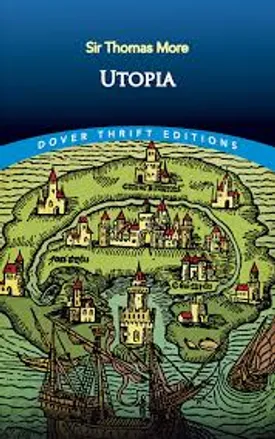Thomas More
Thomas More (1478-1535) was an English lawyer, philosopher, statesman, and author of the classic Utopia. His uncompromising interpretation of Christian ethics, commitment to the principles of civic duty, and powerful advocacy for social justice remain relevant today.
More was born in London to an affluent family of lawyers and courtiers, he was educated at St. Anthony's School in London, then studied classics at Oxford University, where he graduated with a Bachelor of Arts degree in 1501. While at Oxford, he became interested in philosophy, religion, and literature, cementing his lifelong commitment to learning and influence on the course of modern thought.
Following his education, More initially studied law as a way to support himself, as he had little money to finance a career in the arts or theology. He became a prominent barrister, lecturing on Aristotelian logic and developing a formidable reputation in his profession. His success as a lawyer qualified him to enter the court of Henry VII, and he quickly rose to power, becoming one of the most trusted advisors to the king, which allowed him to travel widely in Europe.
Throughout his political career, More was an advocate for justice and aiding the poor, introducing several pioneering policies in service of that mission. Most notably, he was an early supporter of the concept of democracy, believing that it would aid in maintaining harmony in society and that it was essential to a well-functioning government.
Apart from his political career, More is best remembered for his literary accomplishments. Most famously, he wrote Utopia (1516), a novel that depicted an idealistic society rooted in agrarian and civic values. He used Utopia to discuss a variety of pertinent topics, such as religious tolerance, the rights of the poor, the importance of a balanced economic system, and the advantages of a society that has both a spiritual and a materialistic side.
More's Utopia has impacted numerous literary works and political ideologies since its inception. Its influence on the culture around the world has earned it a place in the canon of great Western literature, and has served as a blueprint for much of the civil rights legislation of the past century.
While More had his detractors, his reputation as a respected scholar and conscientious statesman rests on his dedication to truth and his commitment to justice for all. As he wrote in Utopia: “The object I have in all this work is to provide for the public good.” His influence on the Western world over the centuries is reflected in his timeless principles and ideals, which continue to inspire generations of readers.

